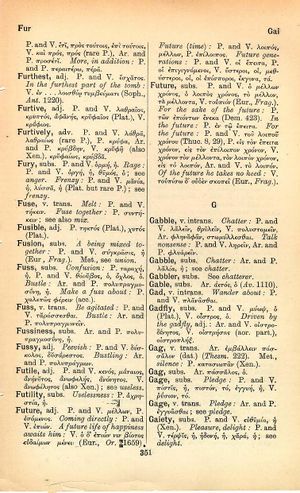gabble: Difference between revisions
From LSJ
τὸ κακὸν δοκεῖν ποτ' ἐσθλὸν τῷδ' ἔμμεν' ὅτῳ φρένας θεὸς ἄγει πρὸς ἄταν → evil appears as good to him whose mind the god is leading to destruction (Sophocles, Antigone 622f.)
(Woodhouse 3) |
(CSV4) |
||
| Line 1: | Line 1: | ||
{{ | {{Woodhouse1 | ||
| | |Text=[[File:woodhouse_351.jpg|thumb|link={{filepath:woodhouse_351.jpg}}]]'''v. intrans.''' | ||
<b class="b2">Chatter</b>: P. and V. λαλεῖν, θρυλεῖν, V. πολυστομεῖν, Ar. φληναφᾶν, στωμύλλεσθαι. | |||
<b class="b2">Talk nonsense</b>: P. and V. ληρεῖν, Ar. and P. φλυαρεῖν. | |||
'''subs.''' | |||
<b class="b2">Chatter</b>: Ar. and P. λαλία, ἡ; see [[chatter]]. | |||
}} | }} | ||
Revision as of 09:42, 21 July 2017
English > Greek (Woodhouse)
v. intrans.
Chatter: P. and V. λαλεῖν, θρυλεῖν, V. πολυστομεῖν, Ar. φληναφᾶν, στωμύλλεσθαι. Talk nonsense: P. and V. ληρεῖν, Ar. and P. φλυαρεῖν. subs. Chatter: Ar. and P. λαλία, ἡ; see chatter.

